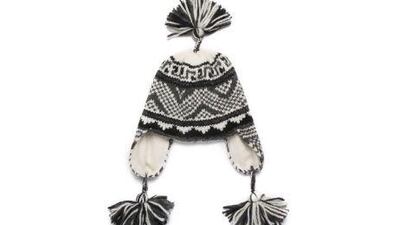If you're going somewhere cold or snowy this winter, you'll need a warm hat. You probably won't want to wear it to the airport here, though. That means choosing something that can go in your hand luggage, to be pulled out - still in good shape - as you step out into the chilly air at your destination. Such versatility does not mean style need be sacrificed for warmth.
Nordic knit with ear flaps
Knitted from 68 per cent supersoft alpaca wool, 22 per cent nylon and 10 per cent wool and a fleece lining, this on-trend Nordic number from Inverni is for the extroverts among us and is deliciously warm. But, as with anything bobbly, it should probably be kept away from anyone over 30. £100 (Dh577), plus £34.95 (Dh202) p&p (00 44 844 686 0808, style-passport.com).
Foldable trilby
The problem with most classic felt hats is that you have to either wear them or see them get creased and crushed. This one, however, is from a new luggage collection from a 19th-century London firm of tailors and fits into a protective travel container when not required for sartorial purposes. It also looks surprisingly good on women as well as the men it is aimed at. £85 (Dh490), plus £35 (Dh202) p&p (edeandravenscroft.co.uk; 00 44 207 405 3906).
Kisser quilted cashmere beanie
Four layers of knitted 100 per cent cashmere make this unisex beanie from The Elder Statesman one of the warmest hats around. It fits snugly around your face and can be pulled down low over the brow or pushed back slouchily on the head according to whim. £280 (Dh1,617), plus £20 (Dh115) p&p (Mrporter.com; 00 44 20 3471 4090).
More of the most durable and practical gear to take on your next holiday at Travel Essentials.

